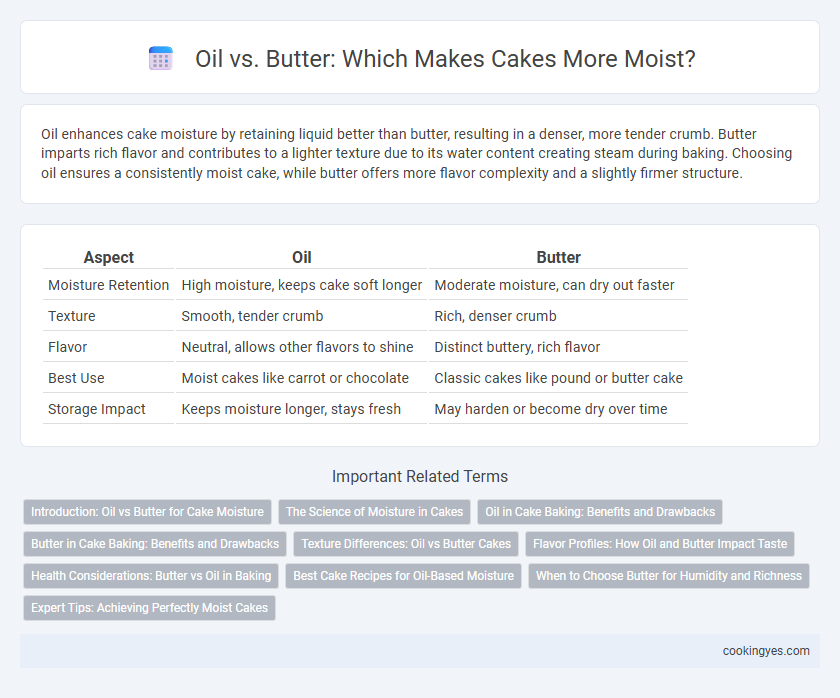Oil enhances cake moisture by retaining liquid better than butter, resulting in a denser, more tender crumb. Butter imparts rich flavor and contributes to a lighter texture due to its water content creating steam during baking. Choosing oil ensures a consistently moist cake, while butter offers more flavor complexity and a slightly firmer structure.
Table of Comparison
| Aspect | Oil | Butter |
|---|---|---|
| Moisture Retention | High moisture, keeps cake soft longer | Moderate moisture, can dry out faster |
| Texture | Smooth, tender crumb | Rich, denser crumb |
| Flavor | Neutral, allows other flavors to shine | Distinct buttery, rich flavor |
| Best Use | Moist cakes like carrot or chocolate | Classic cakes like pound or butter cake |
| Storage Impact | Keeps moisture longer, stays fresh | May harden or become dry over time |
Introduction: Oil vs Butter for Cake Moisture
Oil retains moisture more effectively than butter due to its liquid state at room temperature, resulting in a moister cake texture. Butter contributes rich flavor and a tender crumb but can produce a drier cake than oil-based recipes. Choosing between oil and butter depends on the desired balance of moisture and taste in the finished cake.
The Science of Moisture in Cakes
Oil and butter affect cake moisture differently due to their chemical compositions; oil is 100% fat and remains liquid at room temperature, which helps retain moisture by coating flour proteins more thoroughly and preventing gluten overdevelopment. Butter contains about 80% fat and 20% water, contributing to a lighter texture but less moisture retention compared to oil. The choice between oil and butter influences crumb tenderness and mouthfeel, with oil-based cakes typically exhibiting a moister, denser structure while butter-based cakes offer richer flavor and a silkier crumb.
Oil in Cake Baking: Benefits and Drawbacks
Oil in cake baking provides superior moisture retention compared to butter, resulting in a tender and soft crumb. Its liquid form at room temperature helps maintain the cake's moist texture over time, especially in recipes like chiffon or sponge cakes. However, oil lacks the rich flavor and structure that butter contributes, which may affect the cake's overall taste and crumb quality.
Butter in Cake Baking: Benefits and Drawbacks
Butter enhances cake flavor and texture by providing a rich, creamy taste and contributing to a tender crumb due to its fat content and water ratio. It promotes even browning and a pleasant aroma, but its lower moisture content compared to oil can result in slightly drier cakes if not balanced with other ingredients. Butter's ability to aerate batter through creaming improves cake volume, though it requires careful temperature control to avoid greasiness or heaviness.
Texture Differences: Oil vs Butter Cakes
Oil-based cakes typically produce a denser, moister crumb because oil remains liquid at room temperature, enhancing softness over time. Butter cakes offer a richer flavor and a firmer texture due to butter's solid fat content, which traps air during creaming, resulting in a lighter, fluffier structure. Choosing oil yields consistently tender cakes, while butter imparts a distinct, satisfying crumb texture with more complex flavor nuances.
Flavor Profiles: How Oil and Butter Impact Taste
Oil in cakes creates a richer, more intense moisture that enhances fruit and spice flavors, delivering a tender crumb without masking other ingredients. Butter imparts a creamy, slightly caramelized flavor due to its milk solids, adding depth and a luxurious mouthfeel that complements vanilla and chocolate notes. Choosing oil results in a subtle, neutral taste ideal for lighter cakes, while butter offers a pronounced, buttery richness that elevates traditional cake flavors.
Health Considerations: Butter vs Oil in Baking
Oil generally provides more moisture and a tender crumb in cakes due to its liquid state at room temperature, while butter adds richer flavor and structure because of its fat content and water. Health-wise, butter contains saturated fats and cholesterol, which may impact heart health if consumed in excess, whereas most vegetable oils offer unsaturated fats that can support cardiovascular health when used moderately. Choosing between butter and oil in baking depends on balancing flavor preference with dietary goals related to fat types and nutrient profiles.
Best Cake Recipes for Oil-Based Moisture
Oil provides superior moisture retention in cakes compared to butter because it remains liquid at room temperature, resulting in a softer, denser texture ideal for moist cakes like carrot or banana cake. Popular recipes such as classic chocolate oil cakes and pineapple upside-down cakes rely on oil to enhance tenderness while maintaining long-lasting moisture. Choosing oil over butter in cake baking ensures consistent hydration, making it the best option for cakes requiring moist crumb and extended freshness.
When to Choose Butter for Humidity and Richness
Choose butter for cake recipes that require added richness and a tender crumb, as its fat content enhances moisture retention and flavor depth. Butter's ability to trap air during creaming creates a light texture while contributing to a moist, dense crumb ideal for birthday cakes and pound cakes. Use butter in cakes where flavor complexity and a supple, velvety mouthfeel are desired, especially in recipes that benefit from dairy's natural emulsifiers.
Expert Tips: Achieving Perfectly Moist Cakes
Using oil instead of butter in cake recipes significantly enhances moisture retention due to oil's liquid state at room temperature, which prevents the cake from drying out. Expert bakers recommend substituting oil for butter by using about 75% of the butter's quantity to maintain the cake's rich flavor while boosting moistness. Incorporating oil, especially vegetable or canola oil, creates a tender crumb and prolonged freshness, essential for achieving perfectly moist cakes every time.
Oil vs Butter for cake moisture Infographic

 cookingyes.com
cookingyes.com